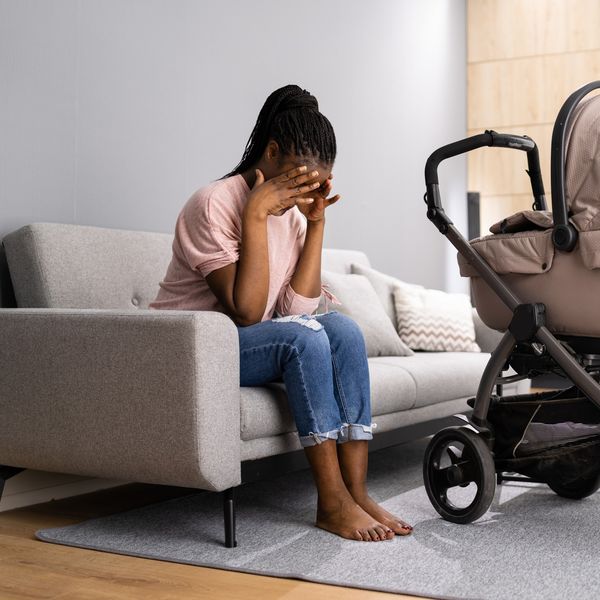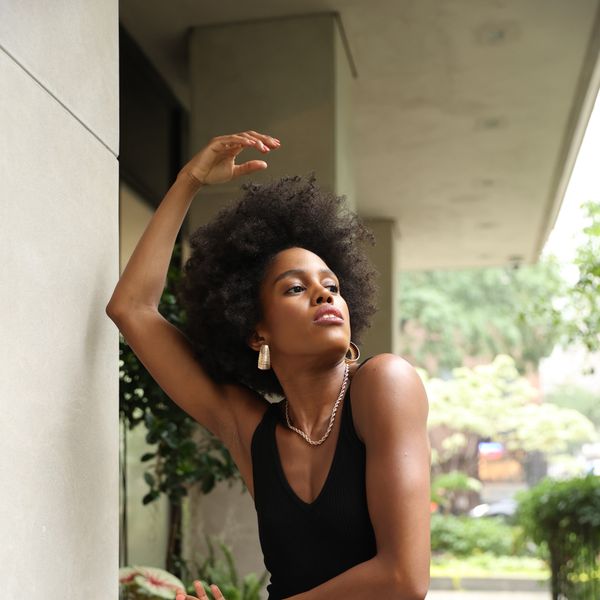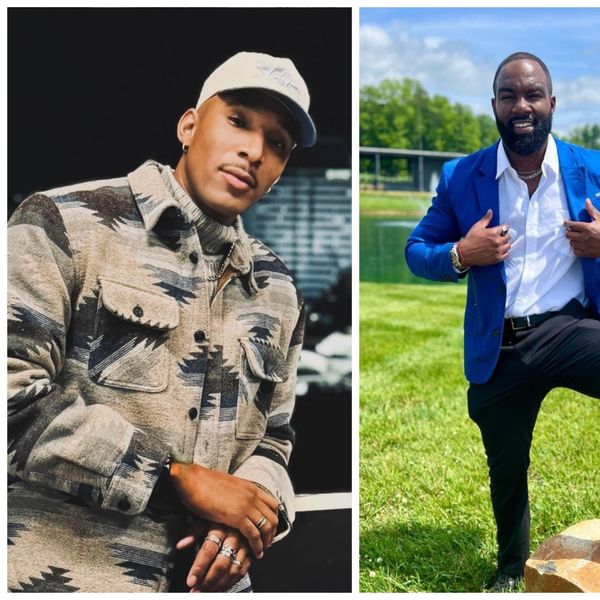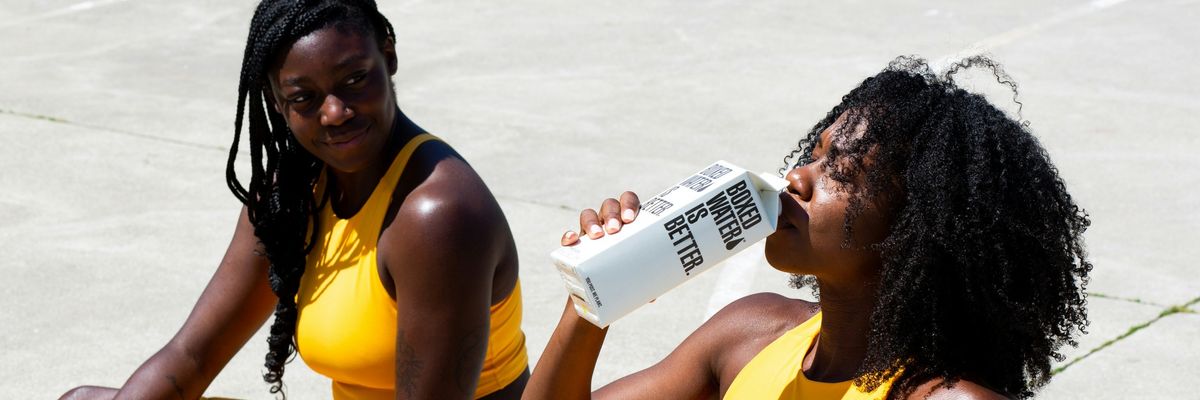
This article is in partnership with National Black Nurses Association.
As crazy as 2020 has been, it has stood as a reminder of the power in the healing process. Though as a society we encountered our share of pain as we were met with job losses, furloughs, civil unrest, untimely deaths, as well as mental and emotional overwhelm, we are doing our best to survive and come together as one. We have become more united in our shared trauma, and have begun to shift our focus on areas where it's needed. The pain and the release of healing. Assisting us in our healing journey both figuratively and literally on the frontlines of this pandemic are nurses.
These frontline workers have long been considered essential by our society, but perhaps their necessity has not been as felt as it has been in the past years. As the spread of the pandemic widened, cases increased, and hospitals became overcrowded with those affected gravely by the disease, nurses proved to be the ones offering a human touch to the way they worked to heal. They went above and beyond to make ailing patients who were isolated due to coronavirus to feel less of the sting of being alone. Add economic struggles to the disparities experienced by marginalized groups and communities in the healthcare system and the disease affecting POC at disproportionate levels, navigating these uncertain times can be difficult to say the least.
For the work that nurses have had to do as healers during this trying time, xoNecole is thanking them in a major way with our partnership with National Black Nurses Association. Below Atlanta nurses and Wellstar nurses fill us in on how they are navigating work demands, patient losses, and fear while embracing their calling.
Alicia Coley, RN
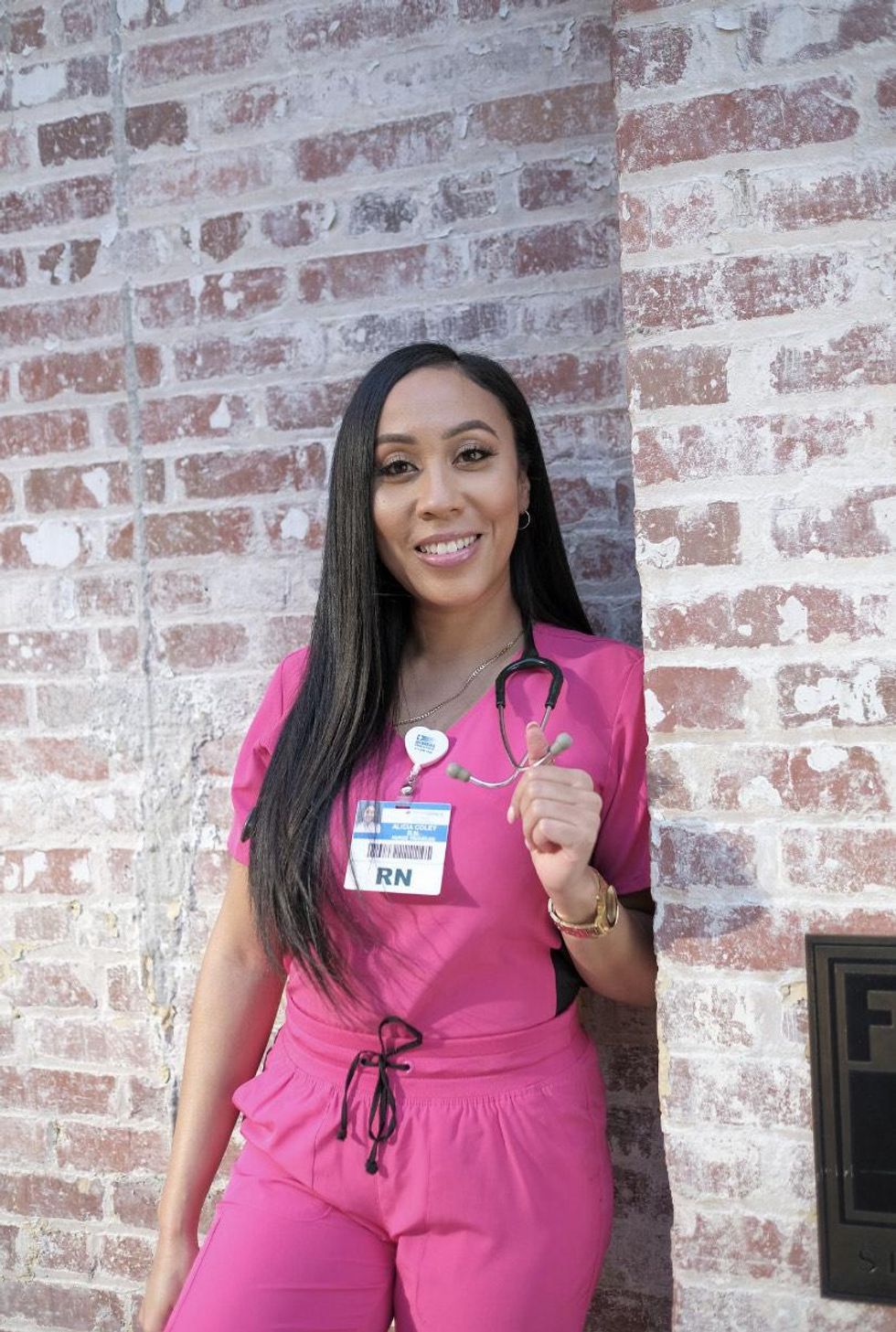
Courtesy of Alicia Coley
Title: Travel Nurse
Length of Time She's Been a Nurse: 10 years
The difference between working in a pandemic versus other times in her career:
"It's definitely been a major adjustment compared to pre-COVID working conditions in the medical field. I noticed there had been a higher than normal demand for nurses due to increased hospitalizations during this pandemic. Full-time staff nurses had been overwhelmed with the patient load. Therefore, we as travelers came in to provide temporary relief. Gowning up from head to toe with the appropriate Personal Protective Equipment (PPE) for every single patient had become the new norm since the patients I worked with were all COVID-19 positive.
"Lack of supply of PPE, at times, was frustrating. I remember units having to be opened up so we can create more space for admissions. One of the hospital campuses I worked at was re-opened and dedicated to taking COVID patients from all the nearby surrounding hospitals. Overall, you had to have tough skin, catch on quickly and care for the sickly patients. Working as a team was very important!"
How it has felt to be even more of a support system to patients amid COVID:
"It wasn't always easy because family members were not allowed on the units AT ALL. Therefore, we were required to call and give an update to family members each shift in the afternoons. It was important for me to remain kind, be empathetic and take care of patients the best I could. There was one particular patient that I saw decline from fully functioning to flaccid over time. That was disheartening. I ended up spending more time in their room because now they could no longer do anything for themselves.
"Continuity of care is encouraged, so you really get to know the patient and you also become familiar with their family member(s) via phone. For this specific patient, I made sure the family got to FaceTime their family member per their request when I worked. Although the prognosis was poor, I believe the family was just grateful to see the patient while they could and talk to them weekly."
What she does for mental health and wellness during a pandemic:
"I naturally enjoy learning about topics on health and wellness. In the midst of the pandemic, I ended up starting my own business where I sell an all-natural elderberry syrup. It's paramount during these times because it's a wonderful immune booster that is loaded with antioxidants, has anti-viral, antitussive and anti-inflammatory properties. Studies have shown that if you take elderberry syrup within the first 24-48 hours of infection, you decrease the severity and duration of your cold/flu-like symptoms! My company is called Alchemi Naturals and this is what keeps me motivated and busy.
"I wake up with a sense of purpose and feeling more fulfilled knowing that I am helping to bring people back to wellness. To support my overall wellness during this time, I make it a priority to meditate daily, exercise regularly, eat a well-balanced diet and consume content on personal and spiritual growth. I also stay busy with learning more ways to grow my business and bring as much value as I can to my customers and my social media platform."
How her purpose as a nurse has been solidified:
"One thing I can say for sure is that I am a huge proponent of boosting one's immune system. I think that is what I advocate the most because it is naturally designed to protect you. Working in a number of different hospital settings will really open your eyes when you come in contact with so many people that have pre-existing health conditions. I have become more passionate about sharing health-conscious information and encouraging people to take care of themselves. These times have solidified my feelings of purpose in my field because I realize now more than ever that nurses are needed! Patients depend on us. It's important that we show up, work as a team and get everyone back to their loved ones."
Tanisha Mcfarlane, RN
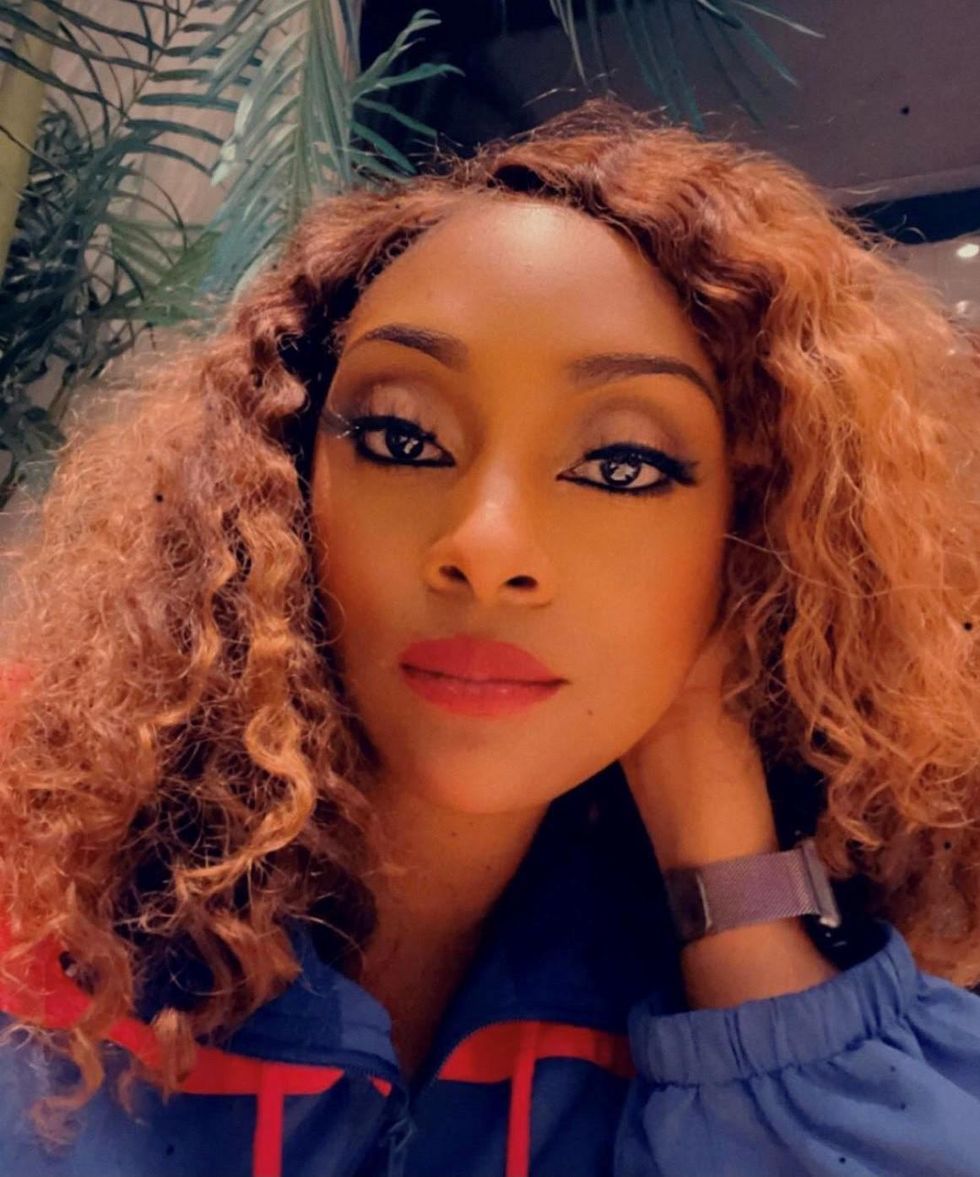
Courtesy of Tanisha Mcfarlane
Title: Travel Nurse; currently working in Emergency Department
Length of Time She's Been a Nurse: 10 years
The difference between working in a pandemic versus other times in her career:
"Being on the frontlines of a pandemic has been very challenging physically, mentally and emotionally. I love and enjoy helping other people so becoming a nurse was just an extension of my purpose. Prior to the pandemic, nursing has had its challenges (working short staff, being verbally abused and sometimes physically abused by patients, and working 12 hours and only being allowed to take a 30-minute break). During the pandemic, some of the normal struggles were intensified but with added stress due to the increased volume and acuity of patients.
"Death is always hard but watching so many people expire in such a small time period was nerve-wracking and it became the new normal, bad as it sounds. In May, I lost three coworkers in one month due to COVID and I think that was when the reality of this pandemic really set in."
How it has felt to be even more of a support system to patients amid COVID:
"The 'no visitor' policy was very much a struggle for everyone. On a personal level whenever I am not well, I call on my family for emotional support so I thoroughly understood the emotional stress patients endured during their hospital stay. I felt that our duty as nurses was to make patients feel as comfortable as possible even if that meant finding a few minutes to video chat family members as a comfort measure.
"At times, it was overwhelming because we were working under a lot of stress, with limited resources and short staff but we were now responsible for updating family members via phone. Imagine finally catching up on things and then the moment you think you had a moment to take a minute to yourself, you have several people on hold waiting on reassurance and depending on you for their confidence that their loved ones are going to be OK."
What she does for mental health and wellness during a pandemic:
"I have always made my family a priority but recently they have been the only thing that keeps me going. I am a first-time mom and that in addition to the pandemic has been heavy mentally but every day I choose to be better than I was yesterday overall. In my downtime, I look up new recipes to try, exercise and plan safe but fun things for my two-year-old son. My son couldn't have been here at a better time because he is my encouragement to stay positive even in my struggles and I am grateful. My husband-to-be is also a nurse so it is helpful that I can vent to him and he understands on a level that not everyone can."
How her purpose as a nurse has been solidified:
"The pandemic has solidified that my purpose has always been to help people. My biggest fear was always not being able to protect the people around me from such a virus. I cared more for them than myself and again nursing is the extension of my purpose. If I was to extract my personal attributes from my career and just looked at it on a financial gain, then nursing wouldn't be the field I would have chosen and that's how I knew it was more than the money for me. It takes a special person and God chose me."
Brandy Perry, BSN, RN
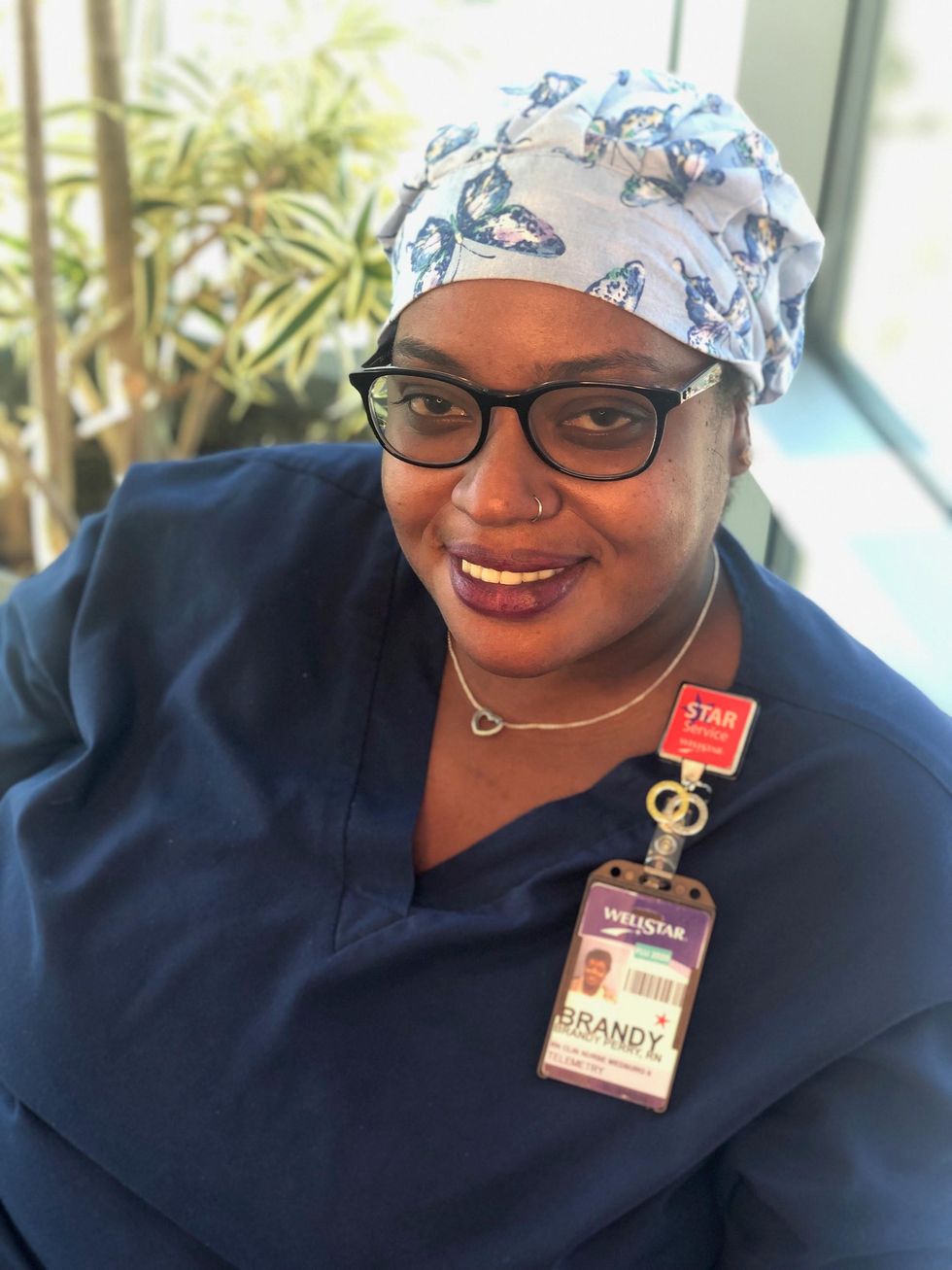
Courtesy of Brandy Perry
Title: Charge Nurse in Progressive Care Unit at Wellstar Paulding Hospital
Length of Time She's Been a Nurse: Six years
The difference between working in a pandemic versus other times in her career:
"Being on the frontline of the pandemic has been one of the most challenging times in my career. Caring for patients during this pandemic has been emotionally challenging because we are continuously fighting this battle for our patients and families. I pray every day that my patients will not say their last goodbye but will instead receive the great news that they can go home to their family."
How it has felt to be even more of a support system to patients amid COVID:
"It has been challenging to watch my patients not having their families with them during this difficult time. On the other hand, I have gained many honorary aunts, uncles, parents, and grandparents in the last year. I am privileged that I was able to connect deeper with my patients as I know they needed my support and guidance more than ever."
What she does for mental health and wellness during a pandemic:
"I find myself calling on my children, family members, and friends more often to check on them. It's also very important to have some downtime to rest and self-reflect on any stressful and challenging circumstances that I have encountered."
How her purpose as a nurse has been solidified:
"I have never been so proud to be a nurse. I truly see the difference we make every day for our community."
Ashley Pugh, RN
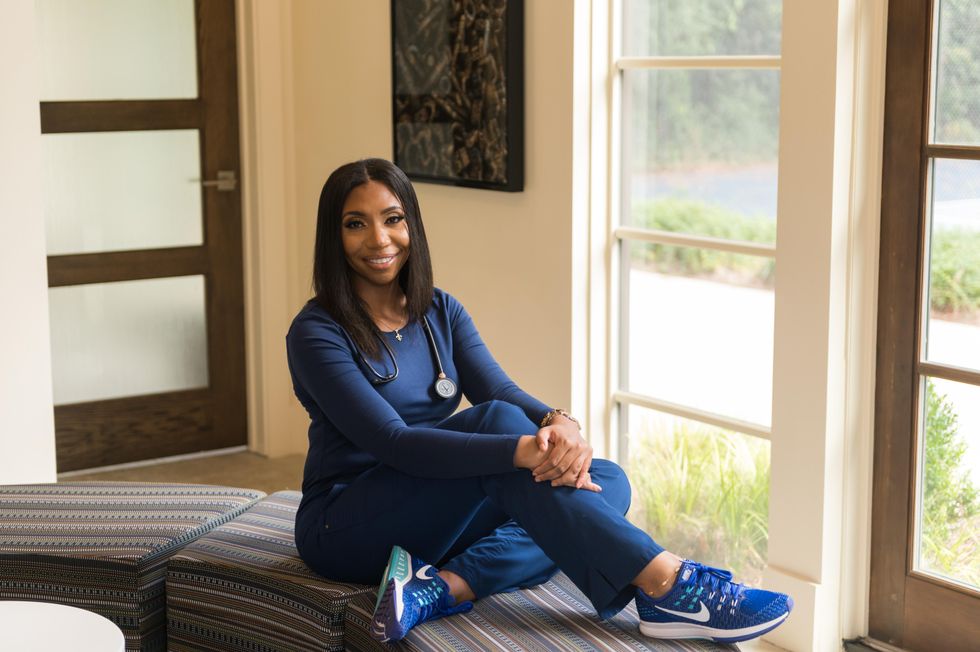
Courtesy of Ashley Pugh
Title: Burn ICU Registered Nurse
Length of Time She's Been a Nurse: 10 months
The difference between working in a pandemic versus other times in her career:
"I came [into the nursing field] at a time when COVID was already ramping up so I don't know anything else. There's obviously less family at the bedside, but since I'm in a critical care area we are able to make exceptions for end of life situations."
How it has felt to be even more of a support system to patients amid COVID:
"Fortunately, the COVID numbers are relatively low in the Burn ICU. We are also the only unit that cares for children. This allows us to make some exceptions in visitation on a case by case basis. Our leadership team also works hard to ensure that we are staffed in a way that allows us to have those caring moments with our patients."
What she does for mental health and wellness during a pandemic:
"I'm not ashamed to say that I pamper myself big time. I've probably purchased every fancy skincare trend you can think of. I'm also a Louisiana girl so I've used this time to get in the kitchen and cook a lot of true Southern cuisine."
How her purpose as a nurse has been solidified:
"This experience allows me to put faces on policies. A lot of times it's hard to understand how the government and political decisions impact individuals. Not anymore. It's important for nurses to use their voices and participate in the decision-making process. We have the experience and we have insight that is critical to improving the health of our country."
Lauren W., RN
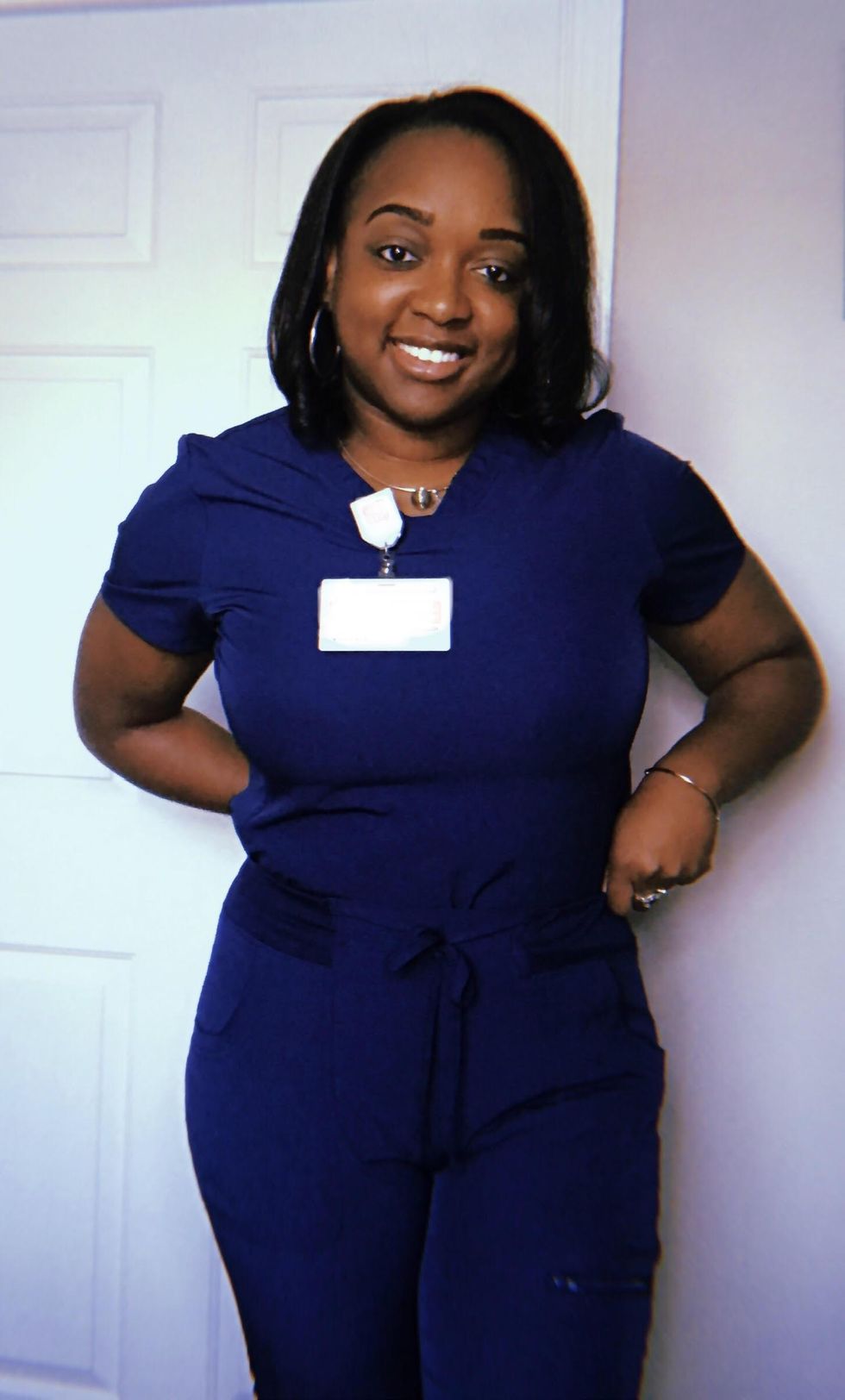
Courtesy of Lauren W.
Title: Travel Nurse; currently working in Progressive Care Units
Length of Time She's Been a Nurse: Seven years
The difference between working in a pandemic versus other times in her career:
"Since the pandemic began in early 2020, there have been many changes in how nurses (and the healthcare system as a whole) approached patient care. For instance, while limiting the spread of infectious diseases within the hospital has always been a top priority, the stress around personal protective equipment, patient procedures, hospital staffing, and visitor policies have been the most highlighted this past year. We increasingly realize the importance of each role in this system. You appreciate the environmental service workers that clean your isolation rooms just as much as you appreciate that manager going the extra mile to get the appropriate staff and supplies. Do we still have a long road ahead of us? Yes. But I think we see how much we are interconnected, and how that plays into providing the best care possible."
How it has felt to be even more of a support system to patients amid COVID:
"It was tough to see my patients feel alone and physically isolated from their support systems during this pandemic. Part of quality patient care is incorporating the family in the process. This gives the patient comfort in what could be the most stressful time of their lives, hospitalization. On top of that, you include a global pandemic that is taking lives every day. Therefore, as much as possible, I personally encourage that patient's family or emergency contact to call the patient throughout their stay, or make sure that the physician updates the family on their treatment plan in order to keep them involved and their anxiety low.
"If I have some extra time in between work duties, I even stay and talk with patients for a few more minutes. Most times, they just want a little more education on their treatment, to share their family or pet stories, or even just chat about their favorite TV program. While it may not seem like much, it could mean the world to someone, and make a stressful day turn around for the both of us."
What she does for mental health and wellness during a pandemic:
"Due to a constant changing environment, work-life balance has been extremely important in maintaining my well-being. I found that doing solid work on my own mental, physical, and spiritual health helped me get through it. It is impossible to pour from an empty cup. Therefore, much effort is made in maintaining a healthy diet, my spiritual practices, and a support system of friends and family to keep my cup full. Even if that means setting boundaries, spending time alone catching up on my hobbies or favorite TV show, or even practicing social distancing with my mask as I take a nature walk. I have to take care of myself first, period. Thankfully, I also have been afforded the opportunity to leave my work at my job for the most part. I HAVE that title, I AM NOT that title."
How her purpose as a nurse has been solidified:
"Throughout my nursing career, I am grateful to have worked as a leader and mentor in several institutions. Yet, my experiences this past year has solidified the importance of employee health and health education for everyone. Therefore, I recently obtained my graduate degree in public health and started a nurse blog, Hey Leux, to help me pursue this field. No organization can be successful without the health and well-being of their employees. Studies have even shown that contributions to an employee's work-life balance, training, compensation, and work environment can increase productivity and quality of service. I hope to combat this in the next chapter of my nursing career as an educator, and to continue to be a positive light and a guiding hand to those who need it."
Maisha 'Mai' Harvey, NP
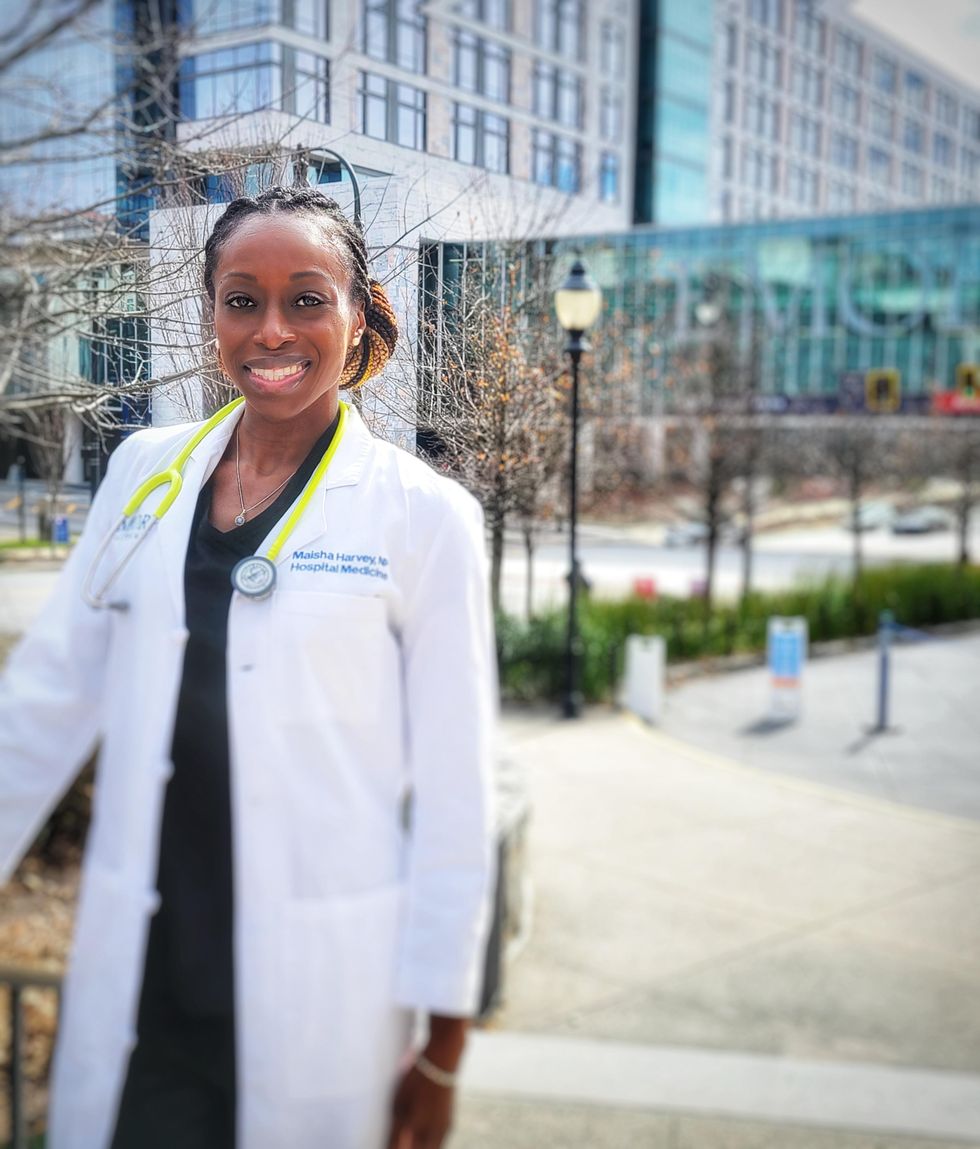
Courtesy of Maisha 'Mai' Harvey
Title: Nurse Practitioner for Emergency Medicine
Length of Time She's Been a Nurse: 15 years
The difference between working in a pandemic versus other times in her career:
"Burnout is at an all-time high. People are tired! You know burnout is real when you have no desire to work any overtime. They are literally throwing money at nurses and providers all across the country because of the shortage. It's one thing to work a lot of hours but pre- vs post-pandemic overtime just isn't the same. Between the pandemic, politics and the regular stressors of life, it wasn't easy facing a mysterious disease that's literally killing people daily.
"In full transparency, I shifted to Emergency Medicine from another specialty just three months prior to the pandemic as I was on the edge of burnout. I came off a schedule that was seven days on/seven days off to currently working three days a week. The new schedule has been a blessing for me in the pandemic as it has allowed me time to recover both mentally and physically. I've been intentional about preventing burnout which is why I haven't worked much overtime. The extra money comes with an emotional toll that's just not worth the trade for me."
How it has felt to be even more of a support system to patients amid COVID:
"One side of the visitation restrictions not well known to the public is the personal aspect. My family, friends and friends of friends reach out for me to check on their loved ones who are admitted to the hospital. I've had family members and friends who have driven past numerous hospitals just to be at my hospital. They knew I'd be there and could always come by to check on them. Over the months, I had joy and some sadness making my rounds to check on people. Unfortunately, not everyone has survived. Experiencing this closeness followed by death more than once has emotionally been difficult but I wouldn't change a thing, nor do I have any regrets. It has been an honor to be there for the patient and their loved ones."
What she does for mental health and wellness during a pandemic:
"I've actually spent more time in nature than ever. Previously, if it wasn't a beach or exploring a new county, I was not about that outside life! I found myself enjoying taking simple walks in my neighborhood. My meditation walks are very peaceful and energizing. It was something about the sun beaming on my skin and the alone time with my thoughts. It has been a much-needed escape from the unknown. Over the summer, I found local parks and even made day trips to random parks all over the state. Who knew Georgia had so many hiking trails with astonishing waterfalls? I even purchased a few plants but that isn't going too well right now. But they still bring me joy!"
How her purpose as a nurse has been solidified:
"My purpose has always been to educate my people about health. It's the main reason I went back to obtain not one but two advanced degrees. The pandemic has added an additional layer confirming this is where I'm supposed to be. People don't seem to understand how I can comfortably walk into a COVID patient's room with no fear. My response, I'm covered in the blood of Jesus and PPE! I was built for this!"
Stephanie McLean
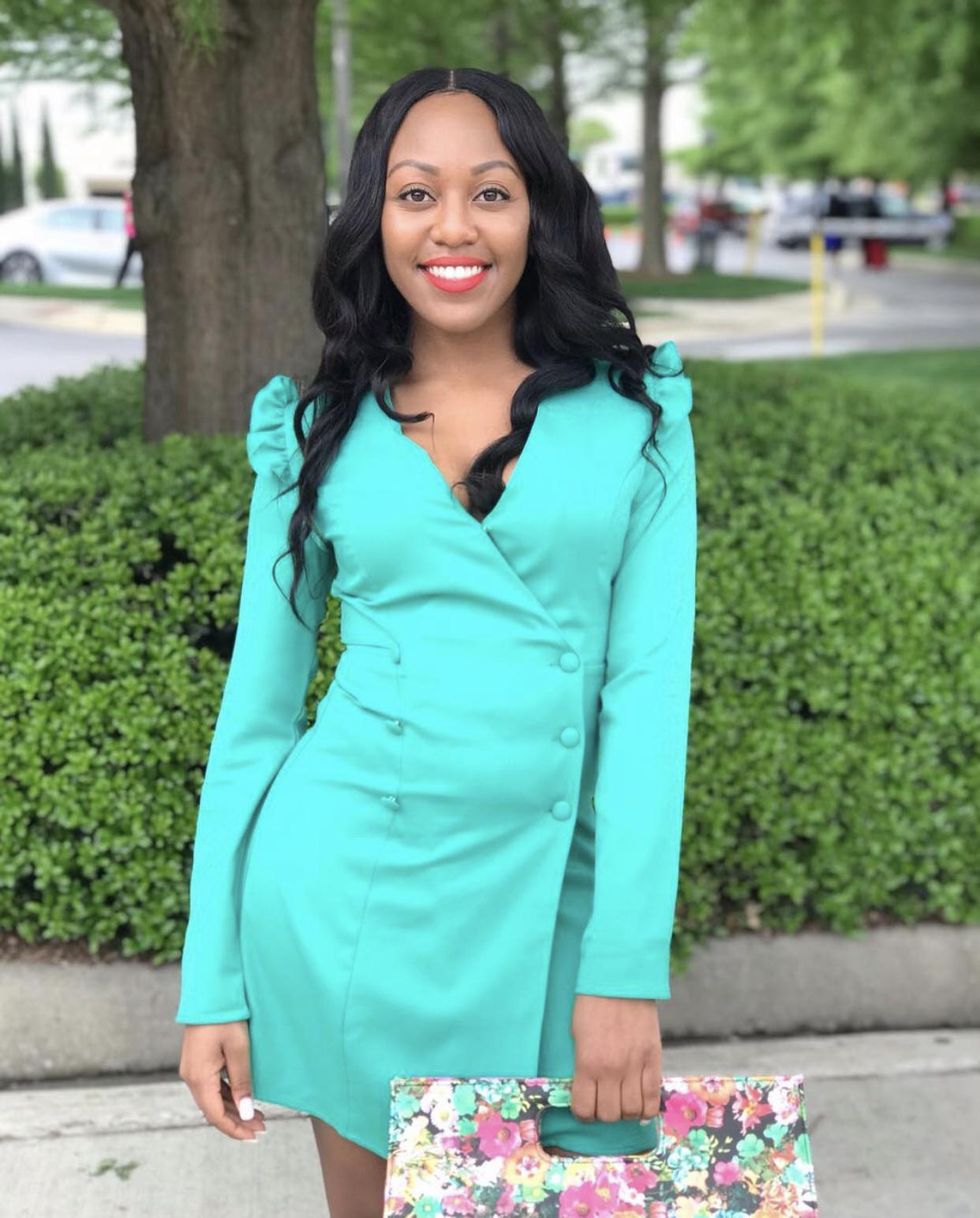
Courtesy of Stephanie Mclean
Title: COVID Crisis Travel Nurse
Length of Time She's Been a Nurse: Seven years
The difference between working in a pandemic versus other times in her career:
"The COVID-19 crisis was something we as nurses did not anticipate, but we had to adapt quickly. Being on the frontlines and having to adjust to new screenings, protocols, and procedures daily was very overwhelming and a change from our routine pre-pandemic. My encounters with patients are met with more of a mental challenge, because now I must make sure I keep myself protected from this very contagious virus. From wearing an N95 mask for 12 plus hours, gowning up in full PPE to go into each room, and sometimes having to relay messages to patients from other healthcare providers are just a few of the ways my world has changed. This shift in the healthcare system has caused an increased patient care load and decreased time to really spend with each patient, which is tough for nurses like me who enjoy talking and spending time with their patients."
How it has felt to be even more of a support system to patients amid COVID:
"One of the hardest parts of nursing during the pandemic has been trying to be a support system to my patients. Since there is a no visitor policy unless it is extenuating circumstances, we have become the closest thing to family on top of being their nurse. It is a challenging task when you become the only listening ear for your patients while they are experiencing so many emotions and spend most of their time alone. I have felt very overwhelmed at times because I am constantly thinking about how I can provide the best care on top of running around, charting, passing medications, and keeping up with doctors' orders.
"On one occasion, I was taking care of a patient that was battling terminal cancer and the policy was unless a patient was on comfort care, he or she could not have visitors. At this time, the decision was not made yet whether this patient would be transitioned to comfort care-only measures. I was on the phone with this man's wife; she was screaming and crying saying she just wanted to visit her husband. She stated they had young children at home, and she knew he was dying, and she just wanted to visit him. That broke my heart. I remember going into the manager's office and explaining the situation almost in tears. I just could not imagine being married and not being able to see my spouse in his last few moments. Thankfully, this situation was rectified, but I will always remember that conversation."
What she does for mental health and wellness during a pandemic:
"On my off days, I take time to destress and I do a lot of self-care. Some of those things include exercising, juicing, meditating, and journaling. These activities help me to declutter my mind and recover mentally so I can be rejuvenated when I return to work."
How her purpose as a nurse has been solidified:
"Working during this pandemic has solidified my purpose of why I became a nurse seven years ago. My passion has always been to serve people from all walks of life and play a part in them returning to their optimal level of health. In this pandemic, I feel like that has only been magnified. There are days that I have been stretched thin and pushed to the limits with so much responsibility. But in these moments, I am reminded that I was placed here for a reason and my patients are depending on me to deliver the best care possible!"
Bianca Ferguson, BSN, RN
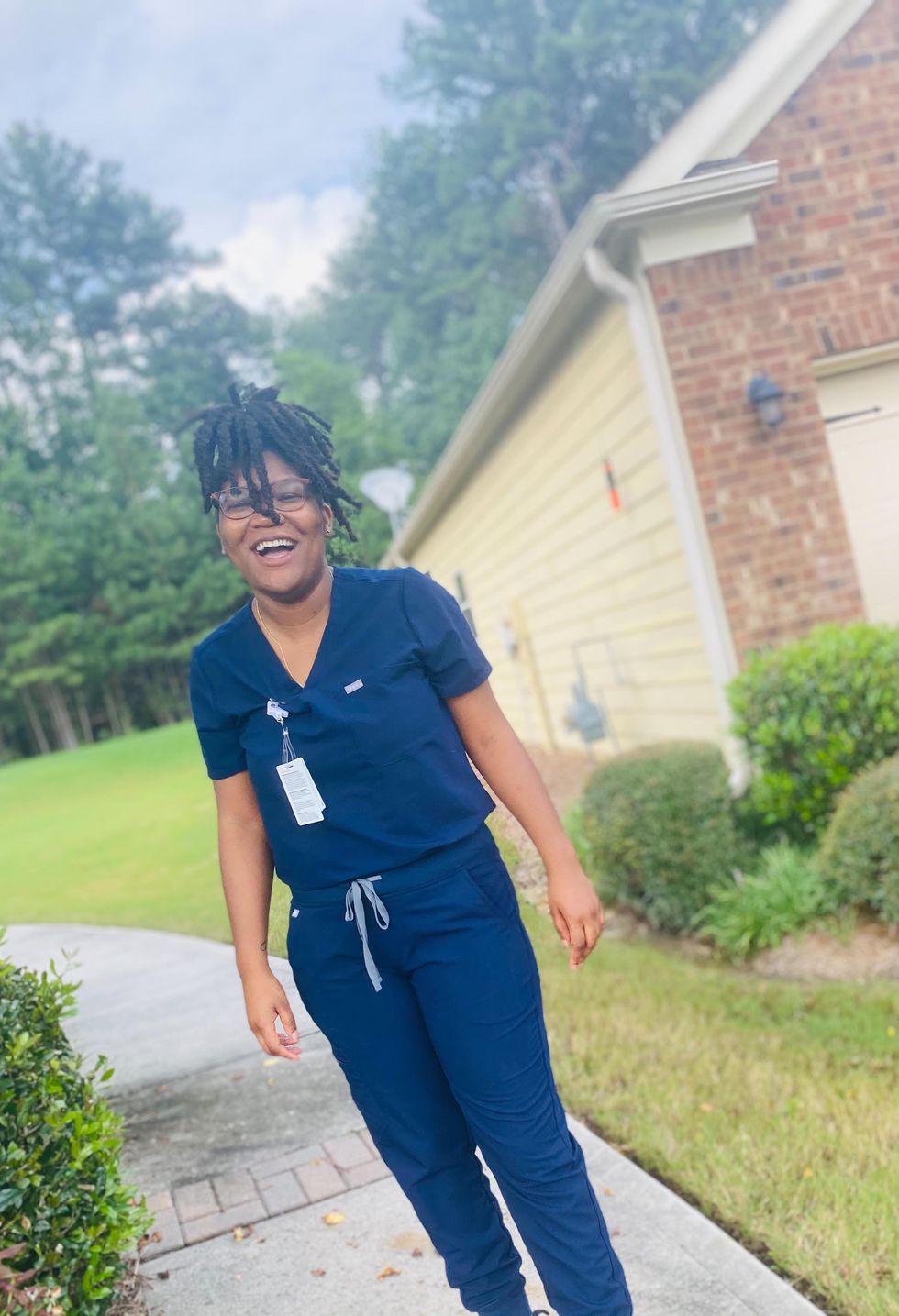
Courtesy of Bianca Ferguson
Title: Medical-Surgical/Telemetry Registered Nurse
Length of Time She's Been a Nurse: Five years and seven months
The difference between working in a pandemic versus other times in her career:
"For me being on the frontlines of a pandemic has been a life-changing experience. Before this pandemic, I went to work with a clear idea of how I would be taking care of my patients. I was confident that my skills and knowledge would get me through each shift. For the first time in my career, each day I walk into work with uncertainty of how the day will end."
How it has felt to be even more of a support system to patients amid COVID:
"It has been an overwhelming, heartbreaking yet rewarding experience. For nurses, not only are we having to do our job, we are also having to be there to support our patients emotionally because their families aren't able to physically do so. I also feel that it is necessary to step in because emotional support can be beneficial to overall healing. It is heartbreaking because not only are these patients fighting to overcome COVID, they may feel alone, so if I can assist by staying in the room a little longer or holding my patient's hand to reassure them that they aren't alone, I'll do that."
What she does for mental health and wellness during a pandemic:
"During these times, I have been lucky to have an amazing support system. My family and friends have supported and encouraged all my decisions during these times. I have found myself traveling to different states and assisting hospitals where the needs are far worse than what I have experienced in my hometown. I am supporting myself by praying, staying positive, and taking all precautions necessary to stay safe. As far as my mental health, I make it a requirement to meet with my therapist frequently to release frustration and recharge my positive energy."
How her purpose as a nurse has been solidified:
"These times have only reassured me that I made the right decision to become a nurse. I made the right decision to choose a career that allows me to see someones vulnerability and deliver holistic care without judgment. During this pandemic, I have had the pleasure of being an ambassador for a movement here in Atlanta to help those in need. #wekeepatlantaalive is a movement geared to give credit to everyone on the frontlines while giving back to the community. A small percentage of any merchandise purchased will be put back into our community. Find out more here."
Kristeen Thrash BSN, RN
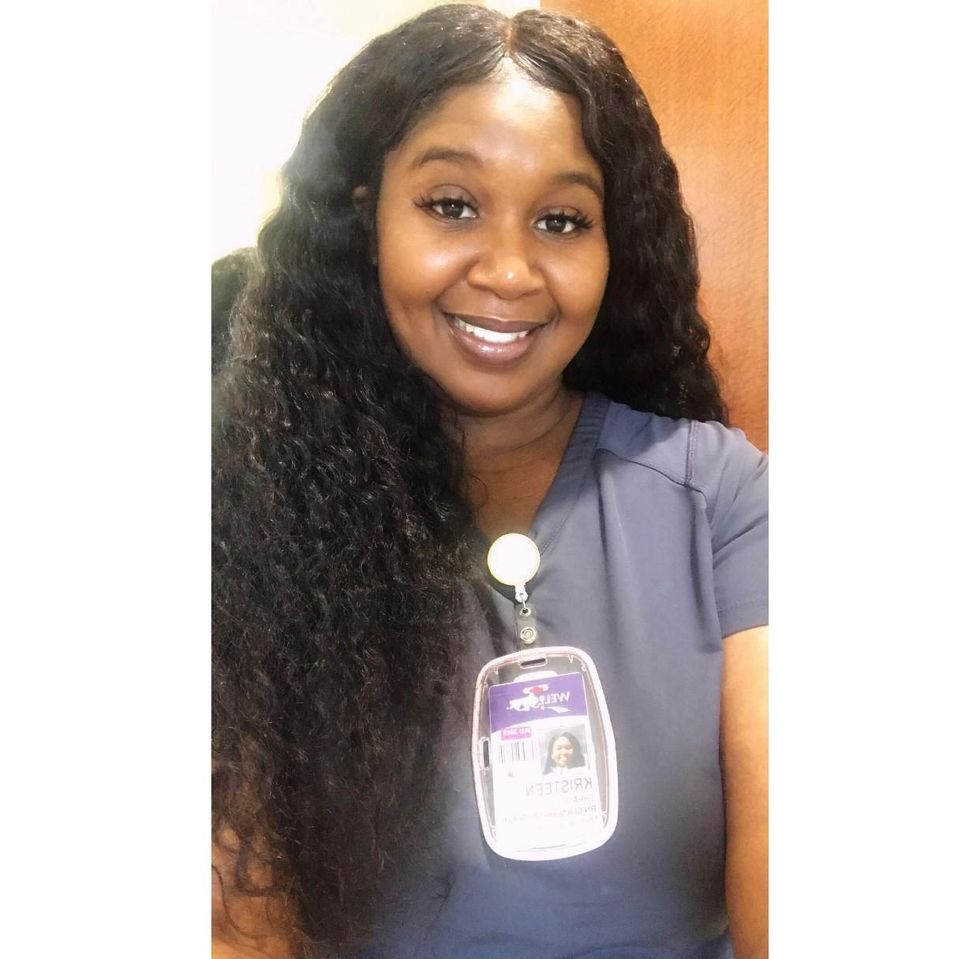
Courtesy of Kristeen Thrash
Title: Assistant Nurse Manager at Wellstar West Georgia Medical Center
Length of Time She's Been a Nurse: Seven years
The difference between working in a pandemic versus other times in her career:
"Working during a pandemic is something I never saw coming when I was in nursing school. It was something that I studied and read about but never fathomed. When COVID-19 first hit, we were afraid, nervous, and concerned for our team members and patients. However, I felt prepared. My professional experience and training as a nurse has helped me push through and remember why I am here in the first place."
How it has felt to be even more of a support system to patients amid COVID:
"Serving as a support system to my patients has given me more purpose. There are so many joyful memories of serving our patients during the pandemic, including helping a patient connect with family by holding up the phone to initiate a FaceTime conversation. We have gotten extremely creative when it comes to getting our patients the support that they need."
What she does for mental health and wellness during a pandemic:
"Something I try to make sure I do daily is unplug. When I am at home, I limit my time on my phone and make sure that I spend quality time with my daughters. I also enjoy reading my bible. COVID-19 has taught me how to seize the moment. Before COVID, I would always have my phone in my hand and spend countless hours watching TV, but those things are no longer a priority. My family, especially my children, have been a source of renewed strength, peace, and motivation. I also make sure that I take excellent care of myself spiritually, mentally, and emotionally."
How her purpose as a nurse has been solidified:
"I feel like everything happens for a reason. I feel like God chose me to be here, in this place, because He has a higher calling on healthcare workers' lives during this season. Nurses are compassionate and feel that it is our duty to protect and save our communities, and I think that we (Wellstar and around the world) are doing an awesome job at it! This pandemic has shown me how strong and resilient healthcare workers really are, and it makes me proud to be a part of such a selfless a group of people."
Nurse Keziah, CPN
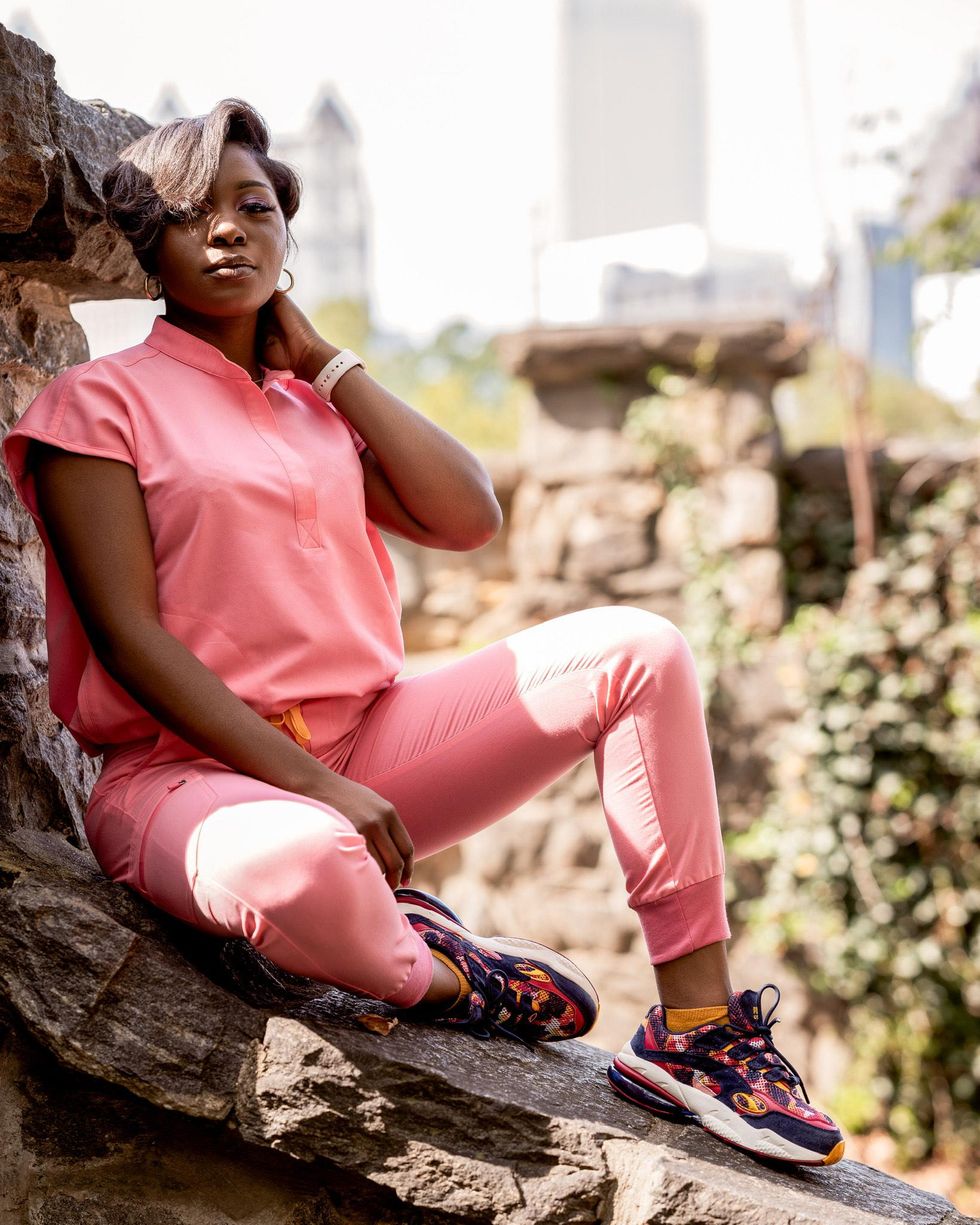
Courtesy of Nurse Keziah
Title: Certified Pediatric Nurse in Medical-Surgical, specializing in pediatric surgery and trauma cases
Length of Time She's Been a Nurse: Six years
The difference between working in a pandemic versus other times in her career:
"2020 was definitely the year of the nurse. The devastating impact of the COVID-19 virus on our communities made the role of nurses more important than ever before. There have been many tough days in my career as a nurse, but nothing comes close to the stress, fear, and anxiety that I have felt working as a nurse in the midst of this pandemic. In the early months of the pandemic, the hospital would adopt new system changes almost daily as new evidence was introduced about COVID-19. It was difficult to navigate through all of the changes at first, but with time, things became more adaptable. Health screenings, temperature checks, the use of masks, and visitor restrictions have become normal features of my work life."
How it has felt to be even more of a support system to patients amid COVID:
"COVID-19 has been devastating for everyone involved. Strict visitation restrictions have affected all patients, not only those diagnosed with COVID-19. It has been difficult seeing the mental health and psychosocial effects of the pandemic on our pediatric patients. Many patients are admitted with complex psychosocial backgrounds where parental support is limited or non-existent. On our unit, we have experienced an increase in gunshot wounds and child abuse cases, particularly affecting our young African-American patients. Let's not forget, we are fighting two different wars here: COVID-19 and racism. Racism and implicit bias have been issues in nursing for a long time. I have found it increasingly important to provide support to patients with little to no support after suffering from trauma. I have made an effort to sit and talk with patients who are alone or hold crying infants who have been deprived from their parents."
What she does for mental health and wellness during a pandemic:
"It truly takes a special person to be a nurse. We often neglect our own self-care, while working hard to care for those in our communities. I have experienced a ton of anxiety and depression during the pandemic as I have struggled to manage stress from work and school while being forced to socially distance in the midst of a global pandemic. As a night shift nurse, I often struggled with social isolation and sleep deprivation; but these challenges have become a lot more difficult to manage as the pandemic progresses. I have created wellness goals for myself to holistically address my mental and physical health needs. These goals include reducing screen-time on mobile devices and television, reading more books for leisure, cooking healthy meals at home, increasing my physical activity, blogging more consistently, and being more intentional in my interactions with family members and friends.
"This past year has taught me to the importance of maintaining strong connections. Life can be taken away from us in an instant, so it is important to forgive others and cherish each moment with those special people in your life."
How her purpose as a nurse has been solidified:
"Although pediatric patients were being diagnosed with COVID-19, this population did not require hospitalization at the same rates as adult populations. At the start of the pandemic, low census rates resulted in many lay-offs and reduced work hours for hospital staff at my current organization. I would sometimes feel guilty being flexed from a shift, knowing that nurses around the world were losing their lives from working overtime in COVID-19 hotspots. But after seeing the impact that the care I am providing has had on my own community, I understand that each nurse plays an important role in preserving our communities and keeping our nation healthy.
"Nurses around the world are risking their own physical and mental health to provide care and support for strangers while putting themselves and their own families at risk. Working in healthcare during a pandemic has been difficult, but I have never been more proud to be a nurse. We are the true heroes."
For more information about the National Black Nurses Association, visit their website, www.nbna.org. Keep up with Wellstar by following them on Instagram @wellstarhealth.
Featured image via Alicia Coley
Your December 2025 Monthly Horoscopes Are All About Surrender & Alignment
December is about letting go. We end the year with the need for more peace, reflection, and rejuvenation, and that is exactly what December is providing for us. The Sun is in Sagittarius, and anything is possible. This is the month to believe in that and to know that the universe is supporting you. With a Supermoon in Gemini as we begin the month as well, we have an opportunity to gain the closure we have been looking for this year and to wrap up old projects, ideas, and communication breakthroughs.
This is the month to make your peace the priority and let go of trying to control the way the tides are turning. Trust in your new beginning, and give yourself time to prepare for it this month.
A big part of the clarity that is coming through this month is due to Neptune going direct in Pisces on December 10, after being retrograde here since July. With Neptune now direct, we are able to see our inspiration and creativity a little more clearly, providing the perfect energy for dreams and manifestation to be built upon. The smoke is clearing, and it’s up to you to decide what you want to do with this newfound clarity that this transit is bringing. Mercury also moves back into Sagittarius on December 11, which is great for communication and clarity, and the adventures you were trying to see through at the beginning of November come around for you again with greater purpose and support.
On December 15, Mars enters Capricorn until the end of January 2026, and this is the extra push we need to make important changes and to be on the path towards greater abundance, stability, and prosperity. Mars in Capricorn takes care of business, and we have extra energy at our disposal during this time to do so. This transit is an ideal time to focus on your career or financial goals for next year and to start putting some of these plans into motion now. A few days later, we have the New Moon of the month, which will be in Sagittarius on December 19, and this is the perfect New Moon to manifest.
The energy is high, magic is in the air, and it’s all about moving forward with the new beginnings that are inspiring you and bringing you joy to think about right now.
Capricorn Season officially begins on December 21, and this earth sign energy is how we heal, gain closure, and build new foundations in our world. With Venus also moving into a Capricorn a few days later, there is something about peace, prosperity, and security that we are gaining in life and in love as we close out the year, and this is what we need right now. This month is about reflecting on what was, letting go of old hurt, and renewing. December is an ending and a new beginning in one, and there is magic in this space to be created.
Read for your sun and rising sign below to see what December 2025 has in store for you.
 AriesKyra Jay for xoNecole
AriesKyra Jay for xoNecoleARIES
December is a full-circle moment for you, Aries. You are seeing the gifts in your world and have a lot of gratitude for the way things have come about for you as of late. There are culminations in your world that are providing you with more abundance, stability, and community, and you are exactly where you are meant to be this month. With the Sun in a fellow fire sign and in your 9th house of travel for most of the month, December is a good time to get out of your comfort zone, explore the world around you, and get your body moving.
Mars, your ruling planet, also makes a change and moves into Capricorn on December 15, which will fuel your inspiration and power in your career space. You are making a lot of professional progress as we close out the year; however, make sure to be more mindful of your competitive drive right now. The New Moon on December 19 is the perfect opportunity for you to create some new plans and goals when it comes to traveling, education, and where you want to gain some new inspiration in your world. Overall, this is a month of things coming together for you serendipitously.
 TaurusKyra Jay for xoNecole
TaurusKyra Jay for xoNecoleTAURUS
December is about trusting your intuition, Taurus. You have a lot on your mind this month, and it’s best to delegate, communicate, and allow yourself some relief by opening up to someone and not feeling like you have to hold everything in. As we begin the month, we have a Supermoon in Gemini happening in your house of income, and the plans and projects you have been building here come to fruition for you now. This is the time to gain clarity on your financial world and to take a look at what spending habits you want to let go of here as well.
With Venus in your 8th house of shared resources for most of the month, you are doing a cleanse on your commitments, partnerships, and business ventures. You are taking a look at what you want to dedicate yourself to in the future, and what commitments you may need to let go of now in order to be in the space you truly want to be, both financially and within some of your relationship dynamics. Before we end the month, we have a New Moon in this same area of your chart, and it’s time to look at the opportunities that are presenting themselves and to trust your internal guidance system to lead you forward.
 GeminiKyra Jay for xoNecole
GeminiKyra Jay for xoNecoleGEMINI
You are moving forward fearlessly this month, Gemini. December is your month of love, passion, and dignity, and you are owning the light that you shine. We begin the month with the last Supermoon of the year, happening in your sign, and you are stepping up to the plate. You are showing up, owning how much you have grown this year, and allowing yourself to heal while also acknowledging that you have done your best and you deserve to have fun in the midst of the changes you are creating.
Mercury, your ruling planet, is officially out of retrograde, and you can use this energy to the fullest potential now. With Mercury in your 7th house of love, it’s time to speak from the heart and to talk about the things that matter and that are inspiring you right now to your loved ones. You never know what kind of epiphanies you may have when you open up the conversation to others. Before the month ends, you have a New Moon in this same love area of your chart, and this New Moon is all about manifesting romance, commitment, and abundance in your world.
 CancerKyra Jay for xoNecole
CancerKyra Jay for xoNecoleCANCER
December is an opening for more love, more joy, and more freedom in your life, Cancer. You have come to a place where you hold so much gratitude in your heart for where you are today and where your heart is shining, and things come together for you with more ease right now. With the Sun in your 6th house of health, work, and daily routines for most of the month, you are getting your ducks in a row while also putting more energy and effort into taking care of yourself, your priorities, and your well-being. This month surprises you in many ways, and it’s because you are showing up.
Mars and Venus both move into your house of love, relationships, marriage, and abundance this month, and you are making strides in your love life. You have both of these opposing forces on your side and are being recognized for the love you are while also receiving the love you want. This month, overall, is about focusing more on the positives in your world and letting your heart have its joy. Before December comes to an end, there is a New Moon in Sagittarius, and this is the perfect opportunity to create the plans you want to see through next year, especially when it comes to your work life, colleagues, business ventures, and health.
 LeoKyra Jay for xoNecole
LeoKyra Jay for xoNecoleLEO
The scales of karma are balancing, and they are balancing in your favor this month, Leo. December is your month of truth, and of seeing it clearly in your world. The Sun is in your house of romance, pleasure, and happiness for most of the month, and it’s time to relax, be in the present moment, and allow what is meant to be, to be. With a Supermoon in your 11th house of manifestation as December begins, this is a powerful month for seeing your dreams come to fruition, and for feeling like the intentions you have set this year are finally here for you now.
Mars also moves into your 6th house mid-month, and this is the perfect energy to have to move into the new year. You have extra energy at your disposal right now and are feeling fearless with what is possible for you and your daily routine. Before the month ends, we also have a New Moon in a fellow fire sign, Sagittarius, and this is a breakthrough moment for you and your heart. December, overall, wants to show you how loved and supported you are and will be doing so in magical, unexpected, and concrete ways.
 VirgoKyra Jay for xoNecole
VirgoKyra Jay for xoNecoleVIRGO
December is a month of victory, Virgo. You are showing up and experiencing some new successes in your world that move you forward on your path in life. With a Supermoon in your 10th house of career as we begin the month, the effort and intentions you have made this year come into full bloom, and you are being recognized for who you are and the good work you have done. This month is all about showing up and allowing yourself to be seen and loved, knowing that you deserve the support and opportunities you are receiving.
Mars moves into Capricorn on December 15, which brings the passion and excitement into your love life, hobbies, and little pleasures in life that light you up. You want to have fun this month and are going to be walking into the new year with this fearless, happy, and spontaneous energy within you. Before the month ends, Venus also enters Capricorn, and in this same area of your chart, you have a lot to look forward to and believe in right now. Overall, December wants you to be happy and will be doing everything possible to make that happen for you. This is your month to shine, Virgo.
 LibraKyra Jay for xoNecole
LibraKyra Jay for xoNecoleLIBRA
December is a month of opportunity for you, Libra. New doors open, and you are financially making breakthroughs this month because of it. December begins with a Supermoon in your 9th house, and you are getting a clearer view of where you have been making strides in your life and how it has all brought you here to this present moment of freedom. This month is showing you what happens when you are fearless with your purpose and when you believe in yourself and what you are worthy of.
Moving further into December, Mars moves into your 4th house of home and family mid-month, and you are closing out the year in your safe spaces. You are spending more time with your loved ones and taking the time to quiet your mind and listen to what your heart has been telling you. Before the month ends, we have a New Moon in Sagittarius, happening in an area of your life that deals with communication. This is a great time for getting the answers you have been looking for and for feeling more clear-headed and confident about the decisions you are making as you move into the new year.
 ScorpioKyra Jay for xoNecole
ScorpioKyra Jay for xoNecoleSCORPIO
Patience is a virtue this month, Scorpio. December is all about remaining patient and vigilant with what you are creating in your world, and knowing that the universe has your back. It’s time to be reminded of the power of hope, and this month is an opening to greater clarity in your life. There is a lot of energy in your financial zones right now, and this is providing you with new opportunities and new insight; however, the speed at which things come about for you may feel daunting. Keep your head up and eyes focused on what you want and know that you are more than worthy of receiving it.
With Mercury in your 2nd house of income this month, December is a good time to plant new seeds and to think about where you want to be financially a month from now or even a year. This month is asking you to think bigger and to think more long-term so that you can set the appropriate plans into motion now. We also have a New Moon in your house of income before the month ends, and this is when you will see more of your dreams come to fruition in this area of your life, and have more opportunities to build. Overall, December will be teaching you a lot, Scorpio.
 SagittariusKyra Jay for xoNecole
SagittariusKyra Jay for xoNecoleSAGITTARIUS
Sagittarius Season is here, and there is a lot in store for you this month, Sag. December is all about what you are dedicating yourself to. It’s about setting your intentions and putting the work in to back up your dreams, and about getting things in order so that when the new beginnings come, you are ready for them. The Sun and Venus are in your sign for most of this month, and there are a lot of eyes on you right now. You have the potential to create a new beginning for yourself, and it’s time to invest in yourself, your love life, and your dreams.
Mercury moves into Sagittarius on December 11, and this is giving you another opportunity to see through some of the plans that you had initiated in November. Mercury was retrograde in your sign last month, and there may have been some disruptions to your vision and plans for the future, and now this energy is turning around for you. Before the month ends, we also have a New Moon in Sagittarius, and you are walking through new doors fearlessly. You are catching others by surprise by your growth this month, and you are thinking a lot about your purpose, future, and plans for the new year.
 CapricornKyra Jay for xoNecole
CapricornKyra Jay for xoNecoleCAPRICORN
December is all about the vision, Capricorn. You are moving through a lot of changes and transformations this month, yet they are giving you a chance at a new beginning in the process. You are focused more on the future and what goals you want to manifest for yourself right now, and are ready to let go of what hasn’t been working for you. With the Sun in your 12th house of closure for most of December, this is your time for healing, but remember, healing doesn’t have to be isolating or boring; you can thrive while you renew, and you are this month.
Mid-month, the excitement picks up for you, and you are feeling more energized than you have in a while. Mars moves into Capricorn until the end of January 2026, and you are being proactive with your goals, intentions, and passions. You are a force to be reckoned with this month, and you are making things happen for yourself with confidence. Capricorn Season officially begins on December 21 this year, and this is definitely speeding up your healing process. You are breaking free from what was, and with Venus also moving into Capricorn before the month ends, you are leaving this year in high spirits and with love opening a new door for you.
 AquariusKyra Jay for xoNecole
AquariusKyra Jay for xoNecoleAQUARIUS
December is all about community, creativity, and manifestation, Aquarius. This is the month to work together with others to help bring your dreams to life. You are in a space of inspiration, empowerment, and beauty, and are creating more of this energy around you and in your world. Look out for what support comes your way this month and know that you don’t have to do everything alone to succeed. With the Sun in your 11th house of manifestation and friendship, your intentions are coming to fruition, and it’s time to celebrate with the people you love and to own how far you have come this year.
On December 19, we have a New Moon in Sagittarius, lighting up your life in all of the best ways possible. This is your New Moon of freedom, victory, and magic, and you are seeing new beginnings appear that you were once just hoping for. Before the month comes to an end, Venus moves into your 12th house of closure, and after an active and successful month, you are ready to relax, heal, and give your heart some of the attention it has been asking for. You are moving into the new year with the need to release and renew what hasn’t been working in your relationships, and you are finally ready to.
 PiscesKyra Jay for xoNecole
PiscesKyra Jay for xoNecolePISCES
December is a big month for you, Pisces. You are making some huge accomplishments this month, and are feeling like everything you have been through this year has been worth it for these moments that are coming to fruition for you now. The Sun is in your 10th house of career and reputation for most of the month, and this is where a lot of your focus is right now. You are claiming your successes and putting yourself out there in ways that not only serve you, but that inspire others as well.
Neptune officially goes direct on December 10, after being retrograde in your sign since July, and you are finally seeing things a little more clearly. You are feeling renewed inspiration and passion in your life, and your intuition is your strongest asset right now. Before December comes to an end, we also have a New Moon in your 10th house of career, and what happens now not only changes things for you in the present, but it also opens new doors and what is possible for you in the new year as well. Overall, you are on top of your game this month and are owning the joy and empowerment you feel.
Featured image by Kyra Jay for xoNecole
I wish I enjoyed drinking plain ole’ water. I don’t, though, and, at this point, I doubt that I ever will. It’s not something that I’m proud of or anything, but like I’ve said in other articles on this platform, to me, water is so damn boring; it’s literally like drinking “wet air.”
That doesn’t mean I don’t accept that it’s a “necessary evil” being that we all are made up of so much water and being dehydrated (which is something that a lot of us are) can cause so many health-related issues, including blurred vision, muscle cramps, dried skin, fatigue and even moodiness.
That’s why, over the years, I’ve been intentional about figuring out ways to get more agua into my body without feeling like it’s a chore or something to dread. And now, I want to pass some of those hacks on to you, just in case you happen to totally relate to where I am coming from.
If something that you want to do more of right through here is get extra H2O into your system, here are 10 tips that can absolutely help to make that possible.
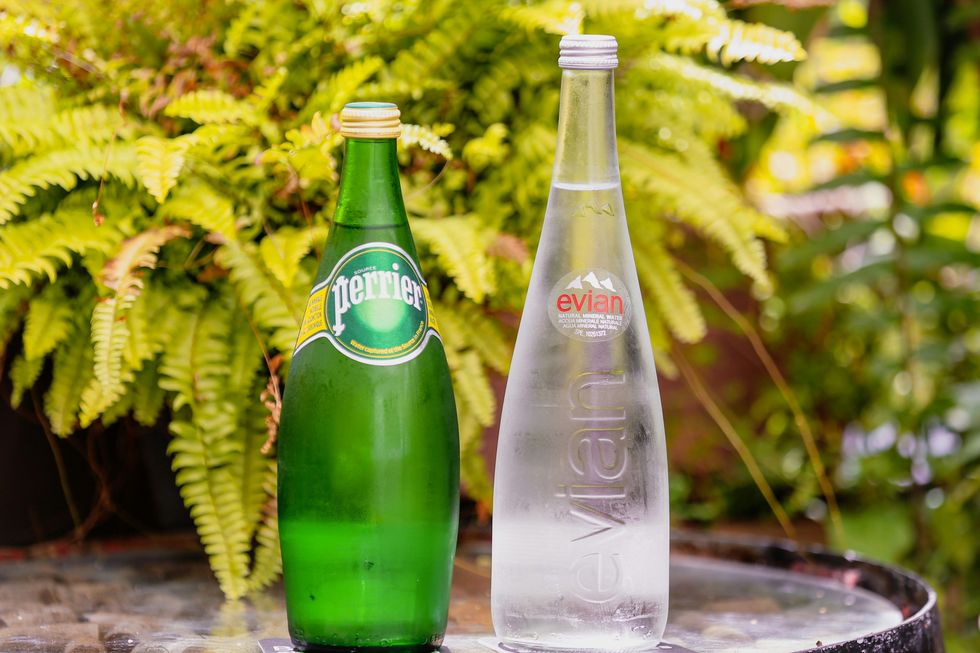
Unsplash
1. Invest in a Fun Water Bottle
There’s a far greater chance that you are going to drink water if you have a water bottle around you. So, cop yourself a cute one — one that will help you to stay motivated. A tumbler that I purchased some time back, just because I thought it was cute as hell, simply says, “Make Better Coochie Decisions” (amen?-LOL). Honestly, that doesn’t just have to apply to sex but how you treat your vagina overall — and that includes making sure that “she” has all of the fluids that she needs.
2. Try Some Sparkling Water or Mineral Water
At this point, I should take stock in Waterloo. It currently is my favorite kind of sparkling water and it has definitely made getting more water into my system easier to do. That’s because I will add some limes to it or a bit of fruit juice to it and that makes drinking water less “meh” for me. Another type of water that has bubbles in it is sparkling mineral water; it can also be beneficial since it contains magnesium, potassium and calcium.

Unsplash
3. Go Halfsies with Your Other Drinks of Choice
Speaking of making some all-natural soda (which is basically what happens when you add juice to sparkling water or sparkling mineral water), you can find yourself drinking more water while consuming less calories if you fill up your glass with half of your favorite fruit juice and half of some sparkling water. More times than not, the juice doesn’t even taste watered down. Try it before you doubt me.
4. Collect Some Infused Water Recipes
I’m forever gonna be a fan of infused water; that’s because it’s water that has fresh fruits and/or veggies in them — and it doesn’t get any healthier than that. Plus, infused water tends to take on the taste of whatever fruits or vegetables that you put into the water (if you let the stuff soak for a couple of hours), so that the water doesn’t taste so boring and bland. Wanna try a few recipes? You can check out some here and here.

Unsplash
5. Make Slushies Instead of Smoothies
Are you someone who enjoys consuming smoothies? Well, if you want to get more water into your system, how about going with a slushie instead? Although it is true that some smoothies have water as a base, the most bomb ones use milk (or a milk alternative) or yogurt. Slushies, on the other hand, typically go with crushed ice (which is frozen water) instead. That said, some (pardon the pun) cool slushy recipes can be found here, here and here.
6. Use Water As Your “Drink Chaser”
Another great thing about water is it can help to keep you from overeating; it does that by causing you to feel full if you drink it while you are eating. And speaking of calorie-counting, if you don’t want to give up your favorite drink at mealtime, one way to keep from downing 2-3 glasses of it at a time is to use water as your “chaser.” What I mean by that is, after enjoying a glass of your favorite beverage, “chase it down” with a glass of water. That should satisfy your want for what you want without overdoing it.

Unsplash
7. Eat Foods That Are High in Water Content
Another way to get more water into your body is to eat foods that have a ton of water in them. Some that top the list include lettuce (96 percent); cucumber (95 percent); zucchini (95 percent); celery (95 percent); strawberries (91 percent); cantaloupe (90 percent), and peaches (89 percent).
8. Have a Ball with Your Ice Cubes
Ice cubes are frozen water, right? That’s why most of us prefer to enjoy our drinks before the ice cubes melt because melted cubes water down whatever it is that we are consuming. And so, for this very reason, add more ice cubes to your drinks — and have fun making them. You can add juice, fruit and/or mint leaves while making your cubes. That way, they are aesthetically-pleasing; plus, they will also add more flavor to your water once the ice cubes actually melt.

Unsplash
9. Add Some Non-Alcohol Cordial to Your Water
If you’re fine with just having a tad of taste in your water, why not add a bit of cordial to it? Cordial is simply a type of tonic, syrup or sweetener (that can contain alcohol or not) that can help to make your water more…interesting. Some alcohol-based cordials can be found here. Some non-alcoholic recipes are located here.
10. Technically, Herbal Tea Counts
Tea is always gonna be my thing. That’s why I’ve penned articles on it for the site like “10 Different Ways Herbal Teas Can Fit Into Your Beauty Regimen”, “10 'Uncommon' Teas You Should Add To Your Stash (& Why)” and “I've Got 10 Teas That Will Help You To Age (Even More) Gracefully” And y’all, if you want to get a lot more water into your system yet a tall glass of water only isn’t your — pardon the pun — cup of tea, make some iced herbal tea instead.
It’s basically water with some herbs tossed in and, if you add some honey or raw organic coconut palm sugar to it, it will be a really sweet treat that will still be extremely hydrating (and very healthy) for you.
Water that is a bit more exciting for you…now. LOL.
Drink up!
Let’s make things inbox official! Sign up for the xoNecole newsletter for love, wellness, career, and exclusive content delivered straight to your inbox.
Featured image by Unsplash





